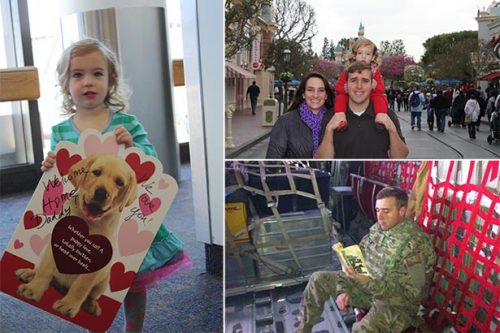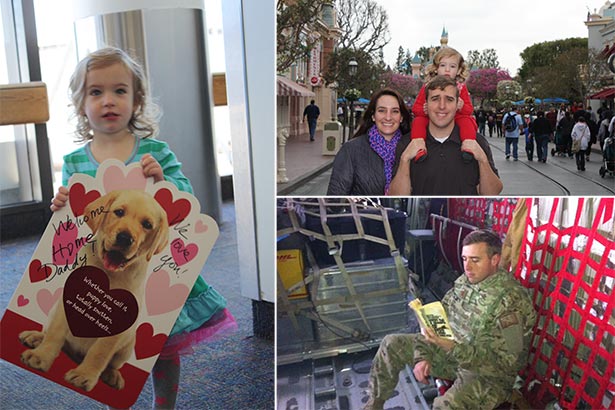

Walking up the jet bridge, nervousness made every step heavy. And not because I had pushed through 200 anxious, though exceedingly generous, travelers to get off the last plane on the long transit from Kabul to the West Coast. A request for airlines: If you are going to thoughtfully honor servicemembers by allowing them to disembark the plane first, don’t wait until everyone retrieves their overhead bags to make the announcement, transforming returning soldiers into a travel inconvenience.
My dark worry, six months after leaving behind my 1-year-old daughter Maddy, is which way she would run when she saw me again.
The military’s policy of R&R leave from Afghanistan, two weeks off for anyone deployed longer than nine months, is invaluable, especially compared to the unending separations of wars past. During five days traveling to the West Coast I had time to dwell on my good fortune to serve in uniform today, despite the dangers of this conflict.
During an overnight layover at Bagram in central Afghanistan, in a neglected Morale, Welfare and Recreation library behind a pool table and a bank of computers used for Skyping home, I found a frayed copy of Jim Webb’s Fields of Fire, perhaps the finest writing on the grunt’s experience in Vietnam, with all its excitement, futility and intense alienation.
Webb, later a U.S. senator, remained skeptical about the depth of concern for the fate of servicemembers among those engaged in political fights back home. His response of authoring the 2008 post-9/11 GI Bill, which paid for my housing and tuition in graduate school, stands as the most remarkable demonstration of support for military service of the last 60 years. It will sharply separate the fate of this generation of veterans from those of decades past.
The attitude of Americans at home demonstrates a similar separation. After a day delivering overdue hugs and kisses to my wife, Katie, blowing missed raspberries on Maddy’s neglected belly and whispering the grateful conversations of return, we headed for a three-day reunion celebration at Disneyland, as tradition demands.
In Anaheim, discounted park passes, a complimentary room upgrade and recurrent thanks for serving underlined the different attitude in the U.S. today, even after a decade of war. Though it is a wonderful experience, I would caution against using all three days offered by the discounted military entry pass in one visit, especially with a toddler who steers from your shoulders using your ears and is more impressed by the swinging lid of a garbage can than by the Pirates of the Caribbean ride and its 90 minute-long line.
Beyond the Magic Kingdom, institutional changes further highlight the improved attitude toward veterans. The education benefits in the post-9/11 GI Bill, increased attention to mental health care and a criminal justice system beginning to direct attention to the unique issues of returning from war make clear this generation faces a much improved social landscape.
Still, unemployment among veterans of recent wars is above 10 percent. Homelessness is too common generally, but veterans make up an inordinate number of those on the street. Several-month delays in screening and treatment at Veteran Administration clinics remain commonplace, both for those scarred visibly and invisibly by our long wars.
Addressing these issues takes resources, and in a world where former Joint Chiefs chairman Mike Mullen identified fiscal debt as the biggest threat to national security, it is unclear how long leaders will maintain tangible support for addressing social issues affecting veterans, especially after the images of soldiers returning home fade. Just two weeks ago, a 10-year funding bill providing resources for veterans programs was voted down as unaffordable in the U.S. Senate.
Military retrenchment in the face of fiscal reality cannot be discounted. Along with ending the wars in Iraq and Afghanistan, the Defense Department has closed dozens of bases around the world. I have assisted in shuttering a half-dozen bases from Keflavik, Iceland, to La Maddalena in the Mediterranean. Policymakers are conducting a heated debate about shrinking the military. As one who served on one of 14 submarines dedicated to Cold War-style, mutually assured destruction, there are significant savings to be realized, despite some sounding another call to arms over Crimea.
Hard discussions on retirement and health care benefits await to prevent the military becoming, as one retired general put it, “a benefits company that occasionally kills a terrorist.”
At the same time, balancing the budget largely on the backs of those who have carried the nation through a decade of war seems unjust, just as reneging on promises made during years of faithful service seems distasteful, even as that has become normal in other economic sectors. The conflict in Afghanistan is remarkable for many reasons, among them the fact that the nation has never been directly asked to pay for the conflict or its effects. Not once have taxes been raised for this war; instead, they have fallen by trillions, despite public votes in Oregon, California and elsewhere demonstrating a civic willingness to reconsider financial obligations.
This type of behavior seems unsustainable. Arriving home for R&R it was painful to realize that many of the same passengers offering applause while I disembarked the plane have elected leaders who are so unwilling to ask for shared sacrifice that the daycare center on my wife’s base began closing to many military families on Fridays because of funding shortfalls. From Kabul, friends scrambled to find child care for children back home.
As a country, we have avoided hard decisions on how to share the burdens of our nation. But today one savings is certain. With the president ordering preparation for a full withdrawal from Afghanistan by the end of 2014, no replacement for my assignment will experience the long walk up the jet bridge. Like so many other positions here, when I leave in a few months, no one will take my place.
And should Maddy (with a bit of encouragement — thank you, Katie) again run my way when I re-deploy home this summer, it will hopefully be the last time. Insha’Allah.